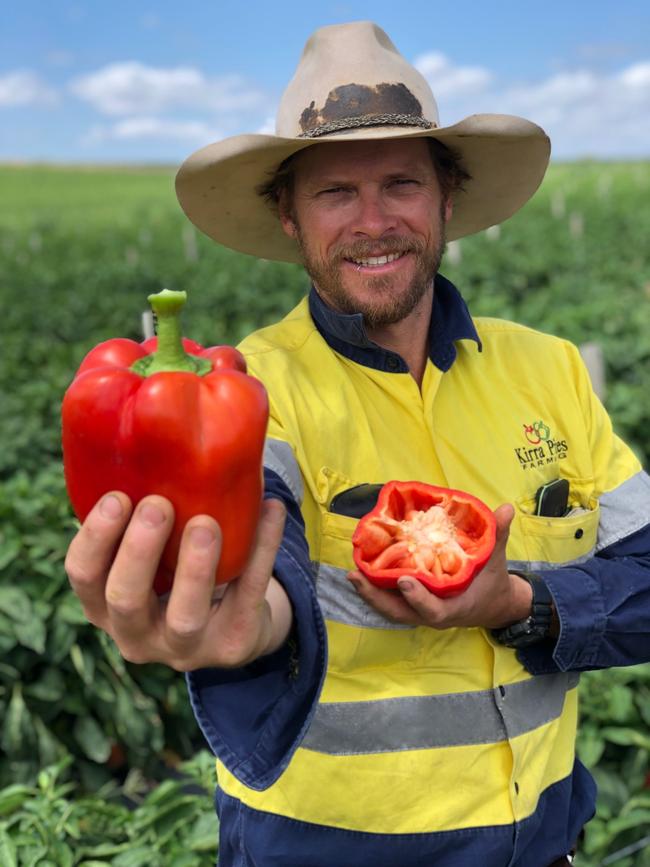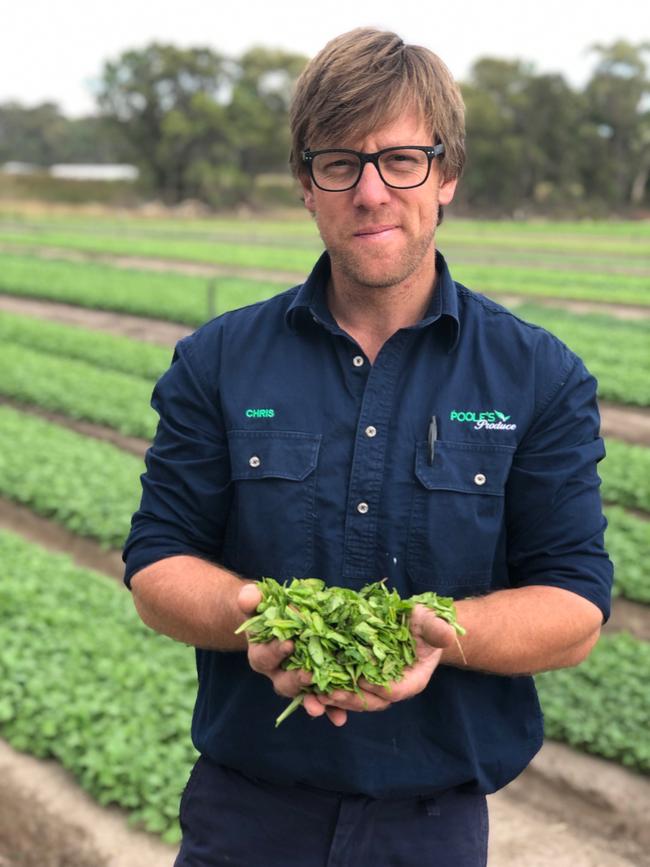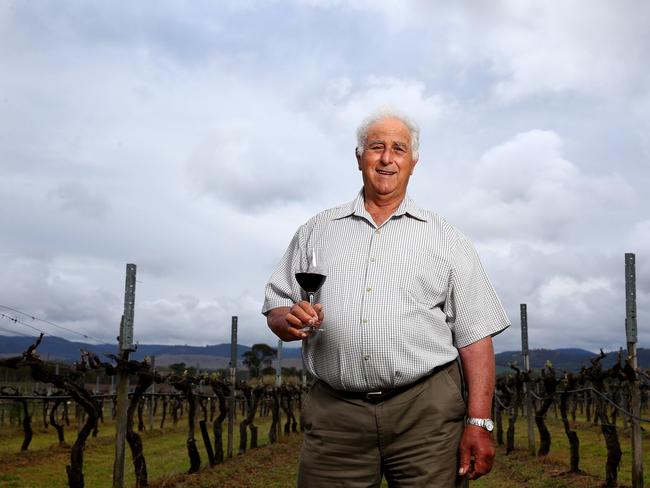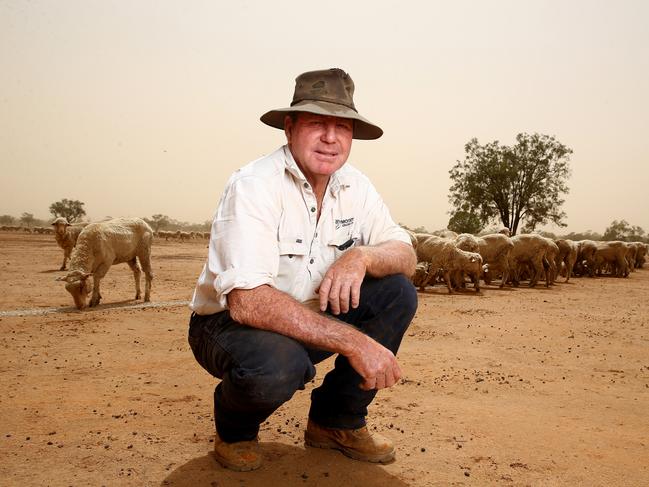Farmers are paying big to truck water and feed to keep crops and animals alive
Desperate Queensland farmers are resorting to a last-ditch bid to save their crops from ruin as the worst drought in memory threatens to wipe out tens of millions of dollars’ worth of fruit and vegetables. But even if valuable crops survive, supermarkets may still make a move that could leave some growers in ruin.
QLD News
Don't miss out on the headlines from QLD News. Followed categories will be added to My News.
FARMERS are spending up to $40,000 a week trucking water from NSW as the “worst drought in memory” threatens to wipe out tens of millions of dollars’ worth of fruit and vegetables on the Granite Belt.
The costly move comes as a dry summer is worsening the drought in Queensland, with 58.1 per cent of the state now drought declared.
Heartbreaking extent of drought revealed
Queensland drought: Get ready for a hellish summer
Drought Appeal launched to help battling farmers
Fourth-generation farmer Tim Carnell, 36, said he had been trucking a million litres of water 24 hours a day, seven days a week to keep his family’s 650,000 Ballandean tomato plants alive, resting only on Christmas Day and Boxing Day. Mr Carnell said there will not be enough water to save his 48ha capsicum plantation, where 1.2 million vines are at risk.
“I know another five growers who are carting water,” he said.
With the usual December rains bypassing the region, orchardists to the north of the Granite Belt warn millions of apples may have to be dumped if they are too small to meet supermarket size requirements.
Vintners, meanwhile, are pruning half the grapes from their vines in a desperate bid to save some of their crop.
“We may have to drop more good fruit on the ground if it doesn’t rain soon,” said Ballandean Estate proprietor Angelo Puglisi.
“The creek is dry. The whole district is in pain.”
Mr Carnell joined Mr Puglisi and other horticulturists in urging the state and federal governments to fast track the Emu Swam dam which was first proposed 38 years ago and given approval by the Beattie government.
They say the $80 million dam would be part of an irrigation network to release water to top up the region’s 94 weirs – all but one of them built and maintained by the farmers themselves.


Vegetable grower Lewis Perkins, who is also trucking water to replenish his dams, said the Granite Belt would have doubled the production of food it produces many years ago if the dam had been built when it was first mooted.
The drought has also disrupted production at the showpiece vegetable and baby salad leaf farm run by Howard Poole and his son Chris at Bapaume, 17km northeast of Stanthorpe.
They must produce up to 150kg a day of rocket, French kale, tatsoi, and mitzuna to meet some contracts, or perhaps 25 tonnes of cos lettuce hearts a week.
However, half their paddocks appear barren.
Lack of water means they have not planted celery, Chinese cabbage or beans this season.
Good monsoonal rains have brought relief in the north of the state but 23 local government areas in the south and west remain drought declared.
The worsening drought conditions in western Queensland have also forced some farmers to reassess their livestock options.

Graziers are turning back to sheep instead of cattle due to higher lamb and wool prices and better management in dry conditions.
The Moody family run the 50,000 hectare Abbadoah Station, near Cunnamulla, with several thousand head of sheep, primarily used as breeders.
Fourth-generation grazier Jesse Moody, 26, said he’d seen nothing but drought conditions during his working life.
The family have invested in feed storage and 99 kilometres of fencing but said rain was what’s needed now to help breathe some life back in the farm.
“It’s been dry for quite a while,” Michael Moody said.
“We’ve just got to keep going until we get some good rain.”
The latest modelling from the Bureau of Meteorology shows there is a below average chance of rain across much of the state between January and March, including the southeast and out to the west.
Agriculture Minister Mark Furner said more than $3 million had been raised in the recent Queensland Drought Appeal, with all of the funds being passed on to “families to be spent locally”.

“As Agriculture Minister, the plight of farmers who are entering their seventh year of drought is never far from my mind,” he said.
“Since the drought began more than $670 million has been allocated to help primary producers deal with the various impacts of drought.
“We will assess the current drought declarations at the conclusion of the wet season.”
Mr Furner said recent good rains in the north had not been replicated in drier southern and western parts of the state.
Gardeners hit by lack of rain
THE lack of rain across Brisbane has upset gardeners.
Only 25.8mm of rain has fallen in the River City this month, well short of the total January average of about 150mm. Weather bureau meteorologist Lauren Pattie said a high pressure system lingering in the Tasman Sea meant it was unlikely there would be any significant rain over the coming week.
“So far this month we’ve had pretty much high pressure systems sitting either over us or in the Coral Sea,” she said.
“So we haven’t seen many trough systems move through the southeast this month.”
But Ms Pattie warned that one big summer storm could significantly boost the city’s rainfall average for the month.
The best chance of some showers is expected early next week. Weather bureau modelling shows a low chance of rainfall exceeding median levels across much of the state between January and March, including the southeast.
Maximum temperatures above 30C are forecast for much of this week with the mercury tipped to reach 33C in Brisbane today.
A high of 36C is expected in Ipswich.


